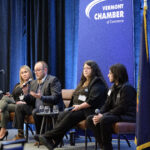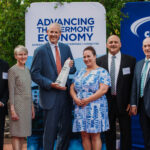Facing the Hard Truths: Vermont Businesses Call for Systemic Reforms
The Vermont Chamber’s recent Business Climate Survey reveals a stark reality: Vermont businesses feel increasingly challenged by rising costs, complex regulations, and not enough legislative focus on tackling systemic changes. From taxes to housing, and healthcare, businesses and residents alike are grappling with the same mounting pressures—escalating costs without proportional returns on investment. The message is clear: Vermont must address its most significant issues with bold, comprehensive reforms to remain competitive and economically intact.
General Business Climate: A Climate of Concern
Survey respondents consistently voiced frustration with Vermont’s business environment, citing rising operational costs, regulatory hurdles, and a lack of workforce availability. With an overall business climate score of 2.56 out of 5, the sentiment reflects significant concern. Businesses struggle to find qualified workers due to high living costs and limited housing, causing some to reduce hours, cut services, or consider relocation.
Taxes: Rising Burdens Without Balanced Returns
Taxation emerged as a dominant concern, with 91% of businesses stating that Vermont’s current tax structure hinders growth and investment. Businesses report feeling overwhelmed by an increasing array of taxes—property, payroll, income, and sales— and regulations while expressing frustration with what they see as inefficient state spending. A staggering 95% believe Vermont is not balancing tax increases with meaningful investments. Without reforms to taxation and spending, respondents fear that Vermont risks jeopardizing its viable business climate and driving businesses—and their employees—elsewhere.
Housing: A Crisis Blocking Growth
Housing availability remains one of the most pressing challenges for workforce development in Vermont. Despite significant state investments, businesses report little progress in improving housing options for their employees. The high cost of housing, combined with permitting restrictions and the increasing prevalence of short-term rentals, continues to hinder efforts to attract and retain workers. To address these challenges, businesses are advocating for streamlined permitting processes and targeted incentives that prioritize market rate workforce housing for renters and ownership.
Healthcare: Costs Rising Beyond Reach
Healthcare costs are another critical challenge, with escalating insurance premiums pushing many businesses to evaluate coverage options. Nearly 45% of respondents have had to adjust their benefits due to rising costs, and smaller businesses struggle most acutely. Employers are seeking systemic reforms to reduce healthcare costs and provide more equitable solutions without shifting the burden solely onto them.
Payroll Tax: Frustrations Over New Costs
Childcare remains an issue for Vermont’s workforce stability, though Vermont’s demographic realities mean that 48% of respondents indicated that none of their employees currently have childcare needs, raising frustrations over the financial obligations to the new childcare contribution payroll tax. For businesses with employees who rely on childcare, respondents indicated that current efforts have fallen short and have not provided effective solutions for working families. Employers report that childcare remains a challenge, with 47% seeing no improvement in affordability or availability since recent legislative changes.
While businesses recognize the importance of childcare, many are concerned about the financial impacts imposed by the new payroll tax, with 87% opposing further increases. These responses indicate that it will be critical to review independent data on how the recent investments are working and if additional reforms, rather than tax increases, are possible.
A Call to Action: Facing Complex Challenges Head-On
The survey underscores a common frustration: Vermont needs to focus on tackling the systemic issues that drive costs and limit growth. Vermont businesses are calling for bold reforms to the state’s tax structure, housing policy, and healthcare system to alleviate pressures and unlock long-term economic potential.
As the 2025 legislative session approaches, the Vermont Chamber remains committed to amplifying these voices and advocating for policies that reflect Vermont’s values while addressing its greatest challenges. The real progress Vermont needs requires facing complex issues directly, balancing costs with investments, and creating an environment where businesses and communities can thrive.
SHARE THIS ARTICLE
RECENT NEWS

















































































